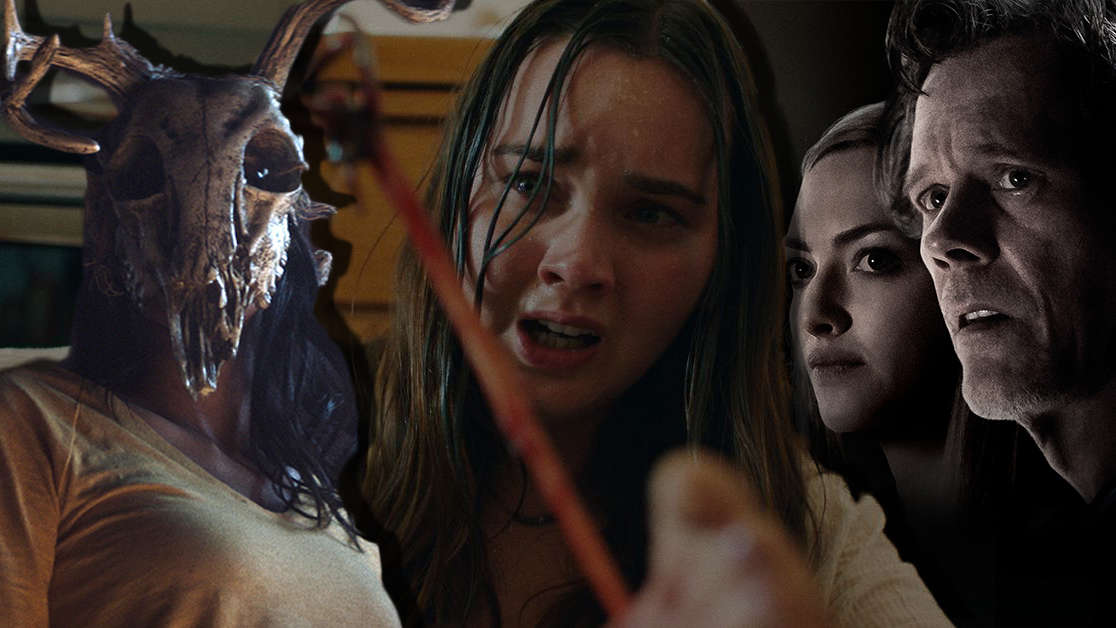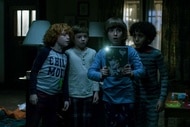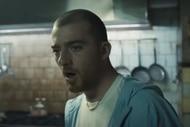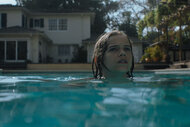Create a free profile to get unlimited access to exclusive videos, sweepstakes, and more!
Our COVID horror movie summer vacation

The lack of big-ticket blockbusters was hardly the most notable life change in the momentous summer of 2020, but it was still a striking reversal of tradition. In a normal year, the summer movie season would be winding down about now; instead, the final few weeks of the usual season will see an uncertain and abbreviated attempt to jumpstart a mini-summer at the last minute, including a limited Labor Day weekend theatrical release for Christopher Nolan’s highly anticipated Tenet and a VOD bow for Disney’s live-action Mulan.
But there was a summer movie season in 2020, even if most of the biggest movies vacated their release dates. In need of titles that could perform well on VOD with a possible side of admissions at still-open drive-ins, distributors of varying sizes turned to horror movies. After a while, certain common ground emerged. You Should Have Left is a horror movie about a family who rents a house in Wales and starts to get lost in its spooky, haunted architecture. The Rental is a horror movie about two couples who rent a house by the beach and make the chilling discovery that they’re being watched and possibly stalked. The Beach House is a Shudder original horror movie about a couple who heads to a family beach house for a weekend away, only to wind up dealing with a mysterious plague-like force. Even The Wretched, a surprise drive-in mainstay from IFC that’s mostly about a forest hag, takes place in a tourist town. All over the summer of 2020, onscreen summer vacations were going awry just as consistently as real-life vacation plans were spoiled.
Of course, hardly any movies released in summer 2020 were made with COVID-19 pandemic anxieties in mind (beyond a handful of low-fi experiments hastily shot and assembled during lockdown). Horror movies are in constant want of new objects or locations to haunt, so it makes sense that multiple movies would turn to Airbnb-like rental services, where users don’t really know much about who’s behind those pristine photos of the lake house with spectacular views. Getting haunted or stalked in someone else’s house also builds in some automatic mystery; these movies often emphasize the characters’ inability to escape from their escape. In You Should Have Left, odd couple Kevin Bacon and Amanda Seyfried make a snap decision to leave their rental when things get creepy, but, of course, eventually, all roads lead right back to their isolated home away from home. In The Beach House, the young couple wanders around through the literal fog in a panic, unable to find any concrete information about what’s going on, or even find their way back to safety.
All three of these Airbnb terror tales also place interpersonal tension in the foreground, with a heightened awareness of how vacations can’t always provide the necessary break from real life. Relying on relationship background isn’t unusual for a slow-building genre movie, but it’s more noticeable in location-based horror movies that eschew the usual creaks, skittering noises, and demonic visions that eventually creep their way into typical haunted-house stories. You Should Have Left has a little bit of that stuff, but it spends a lot of time examining Bacon’s simmering frustrations and hostility over his marriage to the much-younger (and more successful) Seyfried — as well as the real-life demons in his past. The first half of The Rental has a few moments of thriller-ish tension, but for the most part, it’s an unadorned, realistic relationship drama that might be expected from co-writer Joe Swanberg. The Beach House, the clumsiest of the three in terms of characterization, still begins with a young couple in conflict, rather than a big opening scare.
Beyond the expediency of a vacation house as a horror-movie setting, these movies feel particularly appropriate for the summer of COVID — the boogeyman we couldn’t escape, and one we might even make worse by trying to get away for a vacation. They combine the hopefulness of a vacation with the listlessness of not being able to actually go anywhere. By freighting typical summer fun with terror, these movies harken back to the ur-summer blockbuster Jaws, which was summer escapism (and, basically, a horror movie) set during the summer — a cinematic beach read set at the actual beach, about how summer fun could turn deadly. Steven Spielberg's shark thriller feels more relevant than ever: All summer, people pointed out the current real-life parallels between a mayor who refused to close the beaches in the face of public danger and a public health crisis that many leaders refused to take seriously.
But Jaws isn’t known principally for its treatment of feckless small-town political leaders (despite the chilling warning that the same mayor still serves his own interests rather than the public’s in Jaws 2). It’s now famous for transforming the summer movie season from an abandoned boardwalk to a big-ticket amusement park, and naturally, the 45 years’ worth of wannabe blockbusters more closely resembled metaphorical rollercoasters than literal days at the beach. Apart from the occasional shark revival, most summer movies don’t have much direct connection to the season at all. So 2020 became a summer of throwbacks: not just to the drive-in presentations of old summer-movie classics like Jurassic Park, Ghostbusters, and, yes, Jaws, but to the days of seasonally appropriate B-movies rather than A-list franchise entries.
None of these movies, it should be said, are on the level of Jaws. They aren’t even B-movies elevated by superior craftsmanship, with the possible exception of The Wretched, which is already something of an outlier. The Rental fuses two stories so disparate (the uneasy relationship drama and the slasher thriller) that its characters wind up looking stupid for proceeding from one into the other. You Should Have Left, too, is more interesting for its psychological drama than its drawn-out and “scary” second half. The Beach House has some memorable visuals but can’t sustain itself over its full running time either. The Rental and You Should Have Left aren’t even particularly summer-y in their atmosphere; both of their getaways seem to be taking place in chillier, more autumnal climates, or at least a season where you start putting on a sweater in the evening.
But that, too, gives them extra resonance in a year where a lot of people (albeit probably not enough people) were forced to skip over their usual summer rituals. These movies feel like the beginning and end of summer all at once, which might account for how The Rental and You Should Have Left both make hairpin turns away from their slow-building psychological tension, cutting vacations short before they have a chance to flourish. The Wretched ends with the summer season winding down, as the lead character leaves the horrors he experienced behind in the tourist town he visits but doesn’t live in; he drives away with the knowledge that the evil he fought was beaten back but not defeated. In fact, none of these movies end particularly happily, another common horror movie attribute that feels significant when looking at summer 2020 as a whole.
Whether through fumbled execution or by unsettling design, the summer horror movies of 2020 are generally unsatisfying experiences that can’t honestly look ahead with much immediate optimism. They’re a perfect lineup for a summer without the summer movies we expected: Getaways for a time when no one’s really getting away any time soon.














